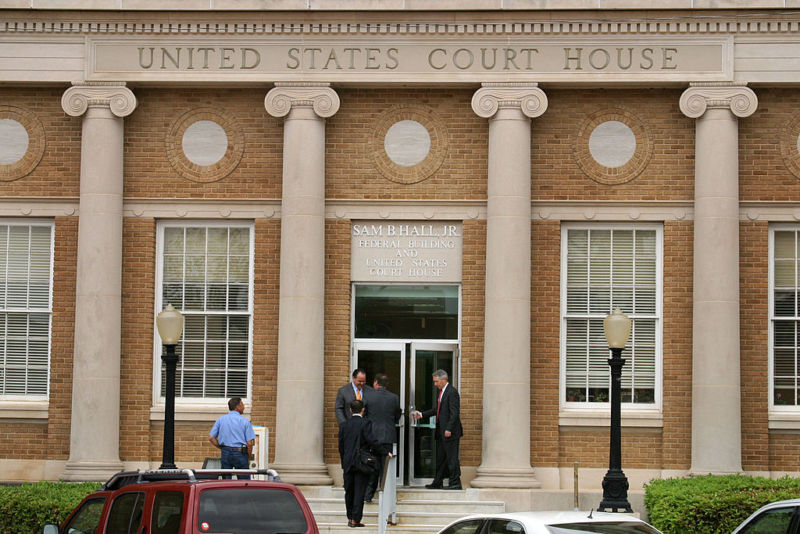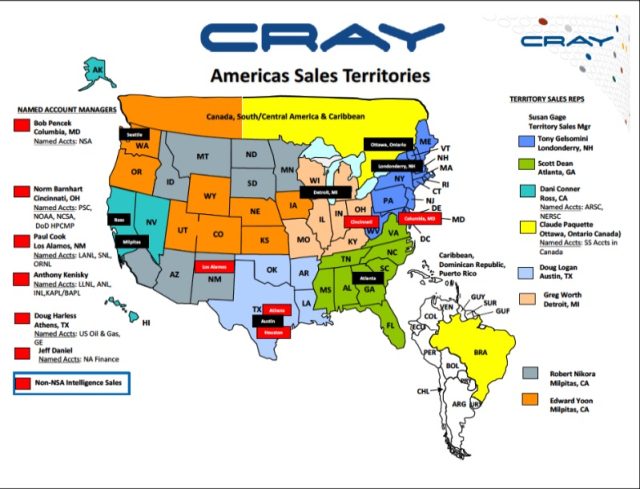
The top US patent court has been asked to consider an urgent appeal from a manufacturer of supercomputers that's desperate to escape an upcoming trial in the patent hotspot of East Texas.
The Eastern District of Texas has become known as a haven for the type of litigation shops sometimes derided as "patent trolls," but the district's strict discovery rules and tendency to favor jury trials has attracted operating companies seeking to enforce their patents, as well. In 2015, Raytheon filed a patent lawsuit in East Texas accusing Seattle-based supercomputer maker Cray Inc. of infringing four Raytheon patents related to supercomputer hardware and software.
Cray filed a motion to have the case dismissed, arguing that the venue was inappropriate. In April, US District Judge Rodney Gilstrap ruled against Cray, noting that the company sold an XC40 supercomputer to the Texas Advanced Computing Center, or TACC, which is located outside the Eastern District, in Austin.The following month, though, it looked like Cray had been thrown a lifeline by the US Supreme Court, which voted 8-0 to tighten up patent venue rules in a case called TC Heartland v. Kraft Foods. The high court held that companies can only be sued for patent infringement in the state in which they are incorporated, or where the defendant company has a "regular and established place of business."
Yet under the new rules, Gilstrap still wouldn't let Cray out of the district. Cray's only tie to the district was a single salesperson, who worked out of his home in the Eastern District. In the judge's view, though, that was enough to find that Cray had "regular and established" business in the Eastern District and would have to face trial.
Gilstrap's controversial interpretation of the TC Heartland decision has been scorned by lawmakers who have supported patent reform efforts. In a hearing about the US patent system last week, Rep. Darrell Issa (R-Calif.) said Gilstrap's move "rejects the Supreme Court's unanimous decision" and was "reprehensible.""Unfortunately, one judge in this district has already reinterpreted both the law and the unanimous Supreme Court decision to keep as many patent cases as possible in his district in defiance of the Supreme Court and Congressional intent," said House Judiciary Chairman Rep. Bob Goodlatte (R-Va.), speaking at the same hearing.
Now, it has become clear that Cray isn't going to accept Gilstrap's decision. The company has filed a petition (PDF) at the US Court of Appeals for the Federal Circuit, asking the higher court to order Gilstrap to transfer the case. If the petition doesn't succeed, Cray will face three separate trials in the Eastern District, with jury selection set to begin on August 31.
Whichever way the decision comes out, it will have a major impact on the tech sector. Tech companies that have been plagued by patent troll-type lawsuits have hailed TC Heartland as a decision that will stop trolls from continuously suing in their favorite venue of East Texas. If this appeal fails and a single salesman is enough to maintain venue, it could greatly lessen the decision's impact.
Venue for the “modern era”
In their petition, lawyers representing Cray point out that their client has no offices in the Eastern District and didn't sell, deliver, or store any products there during the relevant time period.
The only connection is a single employee, named Douglas Harless, who worked for Cray from his home in Athens, Texas, from 2012 to 2016. Harless, who marketed Cray products to oil and gas customers, lived in Athens before he worked for Cray and continued to do so after his employment there. Cray let Harless work from home, but "played no part in selecting its location."
Harless primarily worked with customers in Houston and on the East Coast, and it was he who sold the XC40 to TACC in Austin. Harless didn't have a single customer in the Eastern District, nor did he meet with customers there. Cray reimbursed Harless for his cell phone, Internet, and business travel but didn't pay for anything related to his home.

Gilstrap noted that Harless had made $345 million in sales for Cray, and it's Harless—along with his 903 area phone number—who is listed on the price quotations. In the judge's view, those price quotations are "offers to sell" on behalf of Cray.
The judge cites a 1985 case involving medical device maker Cordis, which found that it had a "regular and established place of business" in Minnesota because the company employed two sales representatives in that state.
Knowing he'll be handed many motions to transfer in the wake of TC Heartland, Gilstrap lays out a four-factor test that fits the "modern era," in which the "physical presence" of a business is just one factor.
Home office subtleties
In its petition to the appeal court, Cray points out several cases in which work-from-home employee activity isn't enough to maintain venue.
Cray lawyers went on to describe major differences between their single salesperson and the work-from-home situation described in the Cordis case that Judge Gilstrap cited. The Cordis employees, who sold pacemakers, kept inventory at home, as well as related literature. They had company cars, in-district customers, and provided support to them, including consultation during operations. Finally, a secretarial service in the district answered calls as "Cordis Corporation," and the sales reps handed out business cards that listed the in-district phone number. None of those factors were present in the case of Cray's single salesman.
"[T]hese distinctions are material," argue Cray lawyers in their appeal. "'Doing business' in a district is not the same as having a regular and established place of business."Cray lawyers paint a chaotic picture unless Gilstrap's ruling is overturned.
"If left to stand, the district court’s reasoning in this case will soon influence the analysis of venue in hundreds of pending and soon-to-be-filed cases in the Eastern District of Texas and elsewhere," states Cray's petition. "This threatens the orderly administration of justice, as the Court’s deferred ruling will require numerous new trials."
We'll soon find out how the Federal Circuit judges see it. Raytheon has seven days to respond. Meanwhile, on Tuesday, Gilstrap issued an order staying the case without explanation.
reader comments
45